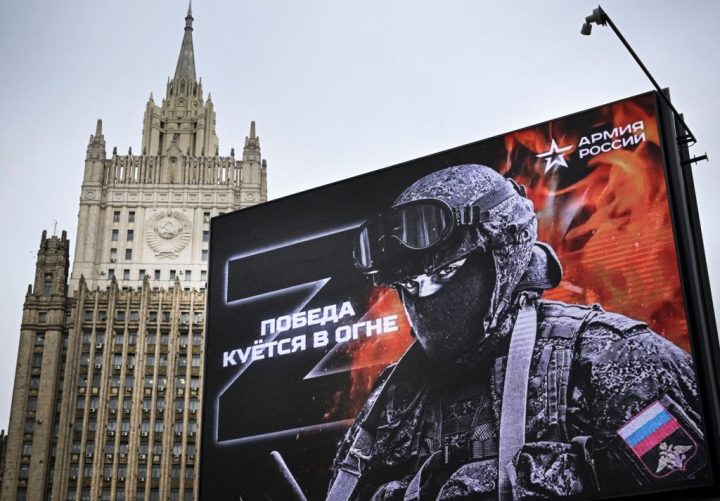Is Vladimir Putin finally about to announce a second mobilisation wave? Ukraine has been warning for weeks that up to half-a-million more troops could be forced into the army. Jitters are growing in Russia that a call-up might be imminent: rumours are circulating that the Kremlin might shut Russia’s borders and resort to a second round of mobilisation. The Kremlin has denied these reports: but Putin is increasingly getting desperate. He needs to find a way to turn this war around. He also needs to fulfil defence minister Sergei Shoigu’s quota that an army of approximately 1.5 million is needed ‘to guarantee the fulfilment of tasks to ensure Russia’s security’ – and defeat Ukraine.
Russia has made no secret of its desire to expand its military capabilities in the coming months. Igor Strelkov, a pro-Kremlin military blogger and former politician, has said another round of enforced conscription looks likely: ‘I think there will be a second wave of mobilisation – we will need to carry it out, and maybe also a third wave, to win in Ukraine,’ he recently said.
Russia has made no secret of its desire to expand its military capabilities in the coming months
‘One should not take Telegram channels in general so seriously,’ the Kremlin’s spokesman Dmitry Peskov has said. But Russians are understandably reluctant to trust what Putin’s regime tells them.
The independent Russian newspaper Verstka reports that bureaucratic preparations are being made which hint something is afoot. The mayor’s office is apparently once more beefing up the number of staff who deal with cases of illegal conscription. Some civil servants have reportedly had holidays in January and February cancelled. This evidence might be circumstantial, but these reports at least suggest the Kremlin is up to something.
Peskov’s denial that any partial or general mobilisation is planned in Russia has done little to stem the flow of chatter on social media networks. At the weekend, pro-Kremlin military-blogger Rybar talked about the ‘mobilisation potential’ of the Russian people and how private gun ownership would benefit future call-ups. The channel General SVR, which claims to have sources inside the Kremlin, suggests ‘general mobilisation, the introduction of martial law…are all being planned’.
The Duma, too, has been holding discussions on mobilisation. Last week, the parliament’s deputy Nina Ostanina claimed that the mobilisation exemption for fathers of three or more children under the age of 16 had been revoked in December. This was denied by senator Andrei Turchak, a senior politician in Putin’s United Russia party. The Duma also yesterday rejected a proposal to exempt holders of scientific degrees from mobilisation. But if, as the Kremlin insists, mobilisation is not on the cards, why are such Duma discussions even taking place?
Shoigu announced that Russia’s first wave of mobilisation formally ended on 28 October, but Putin has never signed any decree, as would be expected under Russia’s constitution, to bring it officially to a close. Anecdotally it has been reported that men across Russia have continued to receive military summons in the intervening months. Just last week, the independent online newspaper Radio Svoboda reported that university students in the Siberian city of Omsk had been ordered by their university to report to recruitment centres in the following days.
If a second mobilisation is announced, Putin is desperate to avoid the chaos that ensued during the first wave, which began on 21 September, after weeks of Kremlin denials similar to those now being issued by Peskov. Many supposedly ineligible men were summoned to fight; thousands took to the streets in nearly 50 cities across Russia to protest, hundreds of thousands more tried to flee the country. Within weeks, reports of ill-equipped, under-trained mobilised men killed straight after being sent to the front line began filtering back to those at home. The panic and anger a premature announcement of a second mobilisation wave would now trigger would be difficult for the Kremlin to reign in.
Verstka cites sources in Russia’s Federal Assembly who say work has been undertaken in recent months to iron out administrative problems such as gaps in the provision of equipment and uniforms to mobilised men. But is this enough to contain any backlash to more Russian men being sent to die in the fields of Ukraine?
Putin knows that he is in a difficult situation – and while a round of conscription might help him on the battlefield it would cause him trouble at home. A second wave of general mobilisation would look rather like an act of last resort for the Kremlin. The Institute for the Study of War says that the Russian army would first try to expand its manpower by other means, such as widening the eligibility criteria for troops, essentially attempting to move the goal posts before attempting such drastic recruitment measures.
Whether Putin will soon make a big announcement, one thing is clear: the war in Ukraine is not going in Russia’s favour. As Shoigu said in December, to have any hope of changing that, particularly in light of the heavy losses the Russian army has sustained in recent months, the Kremlin needs to find more recruits. The possibility that they would once again resort to mobilisation to do so, whether now or in several weeks or months, looks likely.







Comments